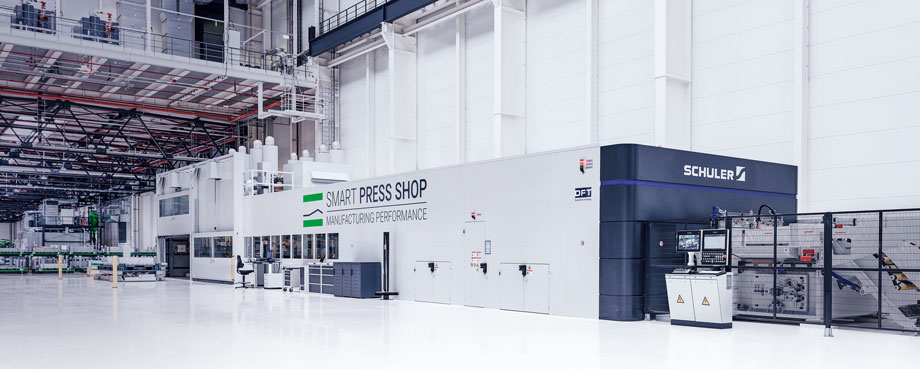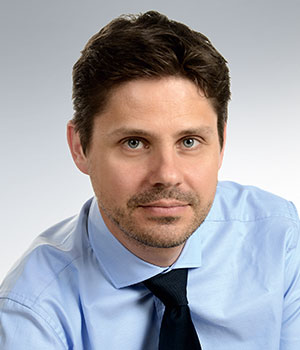End-to-end digitalisation
When it comes to smart factories, Schuler, the world’s biggest press manufacturer, is well ahead of the game. The company is using end-to-end digitalisation and complete transparency to speed up its manufacturing processes.
The factory thinkers have done their bit. The smart factory is their new holy grail. It’s now the turn of the factory makers. The goals of digital transformation are clearly defined. It all comes down to more transparency, knowledge and speed in operations – but what does that actually mean for production managers and those responsible for plants and machinery? Practical experience and solutions from Rittal, Eplan and German Edge Cloud show, step by step, how it can all be done.
Text Ulrich Kläsener, Hans-Robert Koch, Steffen Maltzan ––– Photography
When it comes to smart factories, Schuler, the world’s biggest press manufacturer, is well ahead of the game. The company is using end-to-end digitalisation and complete transparency to speed up its manufacturing processes.
It’s a pity you can’t simply buy an Industry 4.0 turnkey solution. However, that’s not really surprising. After all, whether it’s a case of building a new greenfield factory or reconfiguring an existing environment, the requirements in production facilities all round the world are too specific and the needs too distinct. A blueprint simply doesn’t exist. Perhaps that’s also why many companies have failed in their first attempt to become a smart factory. The big question, therefore, is how companies can make it work second time round. How actually can manufacturers benefit from AI, AR, 5G, condition monitoring and predictive maintenance? How much of that is feasible and what’s worthwhile? Moreover, if we lay aside the big picture of a smart factory for a moment, what preparations does every manufacturing company need to make – and in what way – with a view to acting more intelligently in the future?

Track & trace: Schuler and Porsche use track & trace solutions from German Edge Cloud in their Smart Press Shop in Halle so they can trace bodywork part defects more quickly and effectively.
“It all comes down to achieving complete transparency through digitalization,” says Dr Robert Vollmer, Head of Digital Automotive Solutions at Schuler, the world’s biggest press manufacturer. Why? Alongside topics such as component quality, energy consumption and cost efficiency, Vollmer picks out two major trends in the automotive industry that can only be managed successfully in practice with end-to-end digitalization: “The first challenge manufacturers are facing is small batch sizes – cars are becoming highly customised products. Nowadays, the production line is retooled up to five times per shift – and as a general rule, that means more than ten tool changes per day.” Using data transparency to get things moving faster in manufacturing is therefore an obvious solution. What about the second major trend? “Car manufacturers are going right to the limits in every regard. From a technical point of view, they’re taking everything to extremes – design, consumption, user-friendliness, comfort. This all needs to be taken into consideration as we look back along the process chain to manufacturing and to the suppliers of semi-finished products and raw materials.”

Dr. Robert Vollmer
Head of Digital Automotive Solutions at Schuler
The challenges are therefore well known – but how does a major plant engineering company such as Schuler react to them? With transparency, as it happens. Schuler offers a track & trace solution for press shops as part of its Digital Suite. This means automotive manufacturers can trace their components down to master data level and order level at all times – whether during the production process itself or later on as part of a recall. It’s all a case of drawing the correct conclusions, as Vollmer explains: “In concrete terms, the benefit is far less waste. Given the huge sales in large press shops – materials to the tune of hundreds of millions – this produces big results fast. It’s also obvious that any company that’s producing scrap is not being productive. What’s important for us, therefore, is that operators and factory managers in the field receive precise information and that transparency helps them identify the really important correlations. Isolated information from the ERP just isn’t enough.” Looking at the whole picture – complete supply and production chains in this case – it has been possible to shorten response times to errors and, in the long run, to prevent malfunctions from occurring in the first place.
Dr Vollmer has absolutely no doubt that the Schuler Digital Suite is a text-book example of one of these new, data-driven business models that gives a new dynamism to a supplier from Germany – a highwage country. However, he is equally sure that getting to that point involves crossing some tricky, uncharted territory: “State of the art is easier said than done.”
Part 1: End-to-end digitalisation
Part 2: Complete visualisation
Part 3: Learning and getting going
Part 4: Inspiration for the smart factory
Part 5: Enclosures into the cloud!
Part 6: Up-to-date data during service
Schuler therefore entered into a technological partnership with German Edge Cloud (GEC) to turn what is theoretically possible into a practical application. GEC, a Friedhelm Loh Group company, implemented the track & trace solution on the hardware and software side. The solution works perfectly, everyone understands it and the necessary data sovereignty has been ensured.
German Edge Cloud and its sister companies Eplan and Rittal are currently positioning themselves as technology partners for industry – not just in terms of engineering, sourcing and manufacturing, but also in the operations sector, as Bernd Kremer, COO Cloud & Industrial Solutions at GEC, explains: “We think up new digital solutions for the production areas in a down-to-earth way, align these with the specific challenges facing our customers on site and implement them in the simplest way possible.” Read on to find out how this all works in the Rittal plant in Haiger.